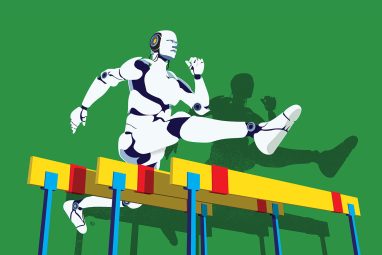Data-driven HRTech is The Cornerstone of Modern Workforce Management
HRtech has a significant role in how organizations track, measure, and boost the performance of their human capital and increase the efficiency of their talent acquisition process.
News
- Core42 and Qualcomm Launch Compass 2.0 to Boost AI Efficiency and Accessibility
- Data Debt Emerges as Core Business Issue for Enterprises
- Are Organizations Investing in AI Achieving Positive ROI?
- Are Increasing Breaches Due to the Cyber Skills Gap?
- What Are the Challenges Firms in the UAE and Saudi Arabia Face in GenAI Implementation?
- Enterprises See the Promise of Generative AI But Lack the Guardrails to Mitigate Operational Risks

MITSMR ME Design
In tech-driven work, the human resource (HR) industry is uniquely positioned to use new technology and leverage the unique human skills needed to hire, motivate, and retain employees.
However, only some companies adopt a modern HR approach, and HR departments remain disconnected from employees’ needs.
That is until now. HR has been changing and responding to fresh workplace demands.
The Middle East region shows workplace diversity, creating a sustainable economic labor force. The UAE, which has embarked on its digital strategy, has seen wide adoption of HRTech, which consists of digital tools, software, and platforms to streamline and optimize various processes in human resources management.
Recruitment firms are adopting new technologies to scout talent for the right job, automate repetitive tasks, and enhance efficiency. Many companies are shifting from traditional HR processes to embracing technology faster.
“The HRTech space has now become an industry of its own in the UAE. Contributing to the creation of a market for HRTech exhibitions, forums, vendors to specialists with skills in digital transformation, data analytics, Human Resources Information Systems (HRIS), and other skills that employers demand,” said Abdulmuttalib Hashim, Managing Director at TBH Advisory.
HRTech has a significant role in how organizations track, measure, and boost the performance of their human capital and increase the efficiency of their talent acquisition process. It also ensures workers work together efficiently and organizations consistently identify and encourage future leaders.
Hashim adds that 94.7% of job seekers want companies to engage with them online, and around 72% of recruiters struggle to find relevant candidates, while 52% said the hardest aspect of their work was screening candidates.
With Gen Z and millennials’ combined population reaching 75% of the total employees in the UAE, HR managers will require a different approach, to attracting them for roles in the industry.
Enhancing Talent Acquisition
“There’s a remarkable transformation in HR practices, driven by the advent of AI and machine learning. These technologies are not merely trends but are reshaping the foundational aspects of HR services and talent management,” says Abbas Ali, Chief Growth Officer of TASC Outsourcing.
AI-powered analytics help predict hiring trends, identify skills gaps, and tailor recruitment strategies accordingly.
“In performance management, AI and machine learning provide real-time insights into employee performance and potential. This data-driven approach facilitates more objective assessments, targeted development programs, and strategic succession planning,” adds Ali.
Globally, organizations are recognizing the benefits of AI in HR, with 35% of companies already using AI in their talent acquisition process. In the Middle East, there’s a growing emphasis on leveraging these technologies for strategic HR management, aligning with the region’s vision for innovation and digital transformation.
Data-Driven Insights
As countries take multiple steps towards economic transformation, attracting and retaining skilled talent is crucial to enabling growth. HRtech tools such as AI-driven candidate assessment, employee onboarding software, and happiness index tools to ensure employee well-being would have a key role to play.
“Data-driven insights have a key role in shaping HR policies and practices and in strategic decision making, particularly given the scope for communication barriers at workplaces,” says M R Raghu, CEO of Marmore Mena Intelligence.
Many regional companies, such as Saudi Aramco and Emirates Group, leverage employee data to identify training needs, workforce planning and scheduling, health and safety needs adherence, and streamlining business processes.
HRTech platforms, such as advanced analytics and AI-driven tools, can be effectively integrated into organizations’ talent management strategies to enhance productivity and foster a culture of continuous learning and innovation.
“Technology platforms like advanced analytics and AI have immense potential to improve employee productivity. An example would be AI and computer vision to generate real-time analytics on manual tasks performed by production employees, which could then be used to remove bottlenecks and improve efficiency,” adds Raghu.
Humu, a tech platform, uses AI to mine worker surveys to identify which behavioral changes could help improve workers’ performance and meet their goals.
The positive attitude of employees and leaders towards tech adoption would act as a key enabler for implementing HR technology.
According to a PwC survey, 46% of respondents in the Middle East recognized that AI had the potential to enhance their workplace productivity. However, readiness gaps and budget restrictions are challenges to deploying HRTech.





